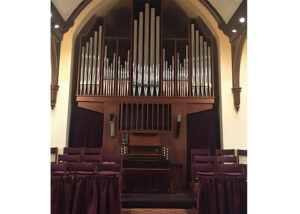I remember a difficult church meeting at my fiancé’s congregation when I was an active participant in the young adult group. I don’t recall the topic, but I do recall that I did not speak up during the meeting, but just listened.
After the meeting, in a circle of conversation, I asked some questions and offered an opinion. I was immediately told that not being a member of the church meant I could not say anything, even post-meeting. I felt silenced and rejected. After our marriage, we found a congregation where we were both welcomed even though we never became official members.
Jumping ahead 43 years, our last month has been a time of relying on the community of faith where we belong. My husband Keith and I have a family member who has lived with us for nearly 10 years. She underwent brain surgery a few weeks ago, and recovery is harder than expected. All three of us are being carried by our community of faith in significant ways.
She interacted a bit with the quilting group at our congregation, and made some friends there. She came to the occasional church service, mostly on Christmas Eve.
But during the weeks before her surgery, when our congregation was praying for her, she came online every week. She accepted a pastoral visit the day before her surgery, for blessing and prayer. She has been welcomed by, and belongs to, our community of faith, even though she says she does not believe in God.
The phrase often used to describe the logical order of faith development in Christendom is “believe, behave, belong.” Mennonite writer Alan Kreider coined this phrase in 1999, proposing revising the order for post-Christendom, starting with belonging.
Many theologians picked up on this idea that faith starts with belonging instead of believing or behaving. What is the impact on how we raise our children and youth in the church? What is the implication for baptism? How are newcomers welcomed into the community of faith? Do people on the edge only count once they are officially members?
Our family member was raised in the church in the last century. She hesitantly enters into church relationships because of the deep conviction that she is not acceptable because she does not have the right beliefs or behaviours. I am so grateful that individuals and pastors in our congregation reached out to her to help her to belong, regardless of those beliefs. Our congregation started with welcome and compassion instead of judgment.
Another theological way of looking at these questions uses a “centred-set” instead of a “bounded set.” Last year, Mark D. Baker of Fresno Pacific Mennonite Brethren Seminary published a book called Centered-Set Church.
Bounded-set churches focus on correct beliefs and behaviour, and only then comes belonging, while centred-set churches focus on the gospel of Jesus as the centre. Belonging is based on whether a person is slowly, or quickly, moving towards that centre. There are no sharp dividing lines about who is in and who is out, about who makes it into the church directory, or about who is prayed for in a church gathering. This means church is not just a supportive community, but a Jesus-centred community.
Our society is increasingly polarized around political perspectives and doctrinal perspectives. My hope is that our congregations are more centred than bounded, and more welcoming than judgmental. We are grateful for the support of our local congregation for us and our family member.
Arli Klassen (klassenarli@gmail.com) is a member of First Mennonite Church, Kitchener, Ont.
Read more The Church Here and There columns:
The wider church and church budgets
On boycotting church
Indonesian peacemaking
50 years of change
Can we see it?









Leave a Reply
You must be logged in to post a comment.